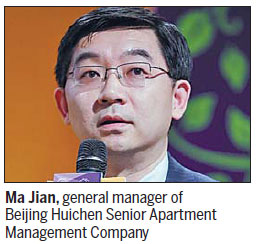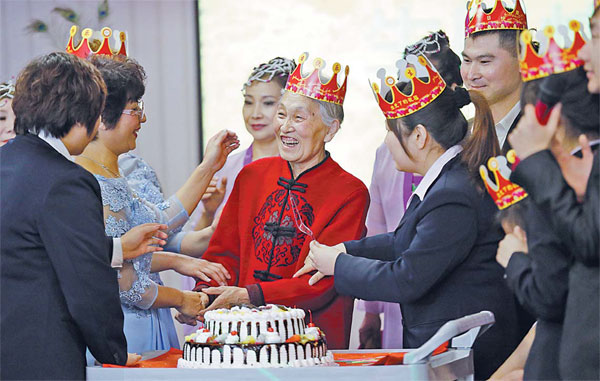Betting on the old folks

Overseas firms see china's aging as a good opportunity, but tradition and lack of rules are obstacles
There are few businesses in which being able to read a crystal ball is as critical, and in which no one seems to know what the ground rules are - precisely because they are yet to be written. Welcome to China's senior care housing industry, a world in which the most commonly used words seem to be if and but.
And yet investors from China and overseas are lining up at the door, apparently willing to invest vast sums into an enterprise where projections span years rather decades and whose returns often seem to be denominated in single digits.
| A resident of Beijing Huichen Senior Apartment Management Co celebrates her birthday. Photos provided to China Daily |
A prediction in the industry says that by the middle of the century nearly 500 million people in China may be over 60, outnumbering those under 18. By then the demand for senior care will be astronomical, analysts say.
Chris Alberti, co-founder of the senior-care organization Cascade, says that for governments this burden will be too much to bear, thus making it necessary for private companies to open and run senior living centers.
Instead of leaving the burden to the government and to families, business can help with that, he says.
But in that, many say, one thing stands in the way of investors: Chinese values.
Tammy Tang, executive director of industrial services in China for Colliers International, says that while the senior-care concept has long existed in China, it is philanthropic rather than commercial.
"Chinese people see senior-care centers as being built for elderly people who have no family members to support them, and children sending parents to such centers would be largely regarded as lacking filial devotion."
But many of the companies that are pioneers in the industry in China, mostly European or from the US, do not seem to be bothered by this issue.
Nathaniel Farouz, CEO of Orpea China, a French senior-care company, says the problem is not unique to China. Europe went through the same thing about 40 years ago, he says, especially in countries where Catholicism holds strong sway, such as Italy and Spain.
Now in China most women are in paid employment, the cost of living keeps climbing and people are inevitably becoming more individualistic, so opting for an elder-care center is a good choice for many families, he says.
However, the industry remains so new in China that investors cannot even agree among themselves about what the formula might be for turning a profit, if there is indeed one at all.
"No one is confident enough to call himself or herself an expert in this field in China," Tang says. "Real estate developers are still trying different products and various financing channels."
For the moment, investors seem to have plumped for two standard ways of proceeding, the rental model or the sales model.
Some investors rent properties for the elderly and provide ancillary medical care and other activities. Others use "senior care" as a selling point by building facilities such as saunas, fishing ponds and gyms in communities and selling them to retired people.

The latter practice is less medically oriented, and developers can get their investment back much more quickly. The buyers are younger, healthier people who are quite mobile.
The rental model generally targets those who are older than 80 and need almost constant care by trained staff. The drawback with this model is the high cost of providing medical care and training and paying staff, which means high prices have to be charged if the business is to turn a profit. But that in turn is likely to deter all but the most well-off from taking up the offer.
Farouz, of Orpea, says the key is to find a piece of land close to the residents' families, but in first-tier cities, leasing properties can be incredibly expensive.
Their 188-room center in Nanjing is due to open this year, targeting people older than 80, and just 100 meters from a hospital.
Orpea says it also plans eventually to open similar centers in Beijing and Shanghai.
Another company that has opted to rent and manage senior-care facilities rather than buy and own them is Beijing Huichen Senior Apartment Management Co.
"We lease properties and renovate them, installing senior-care facilities," says Ma Jian, the company's general manager.
Even though it finds that approach more lucrative, the returns are still slim, even when the center is fully occupied, he says.
The company plans to open another four centers by the end of the year to add to the three it now has.
Taking up the cudgels for those who argue for a rental model in the industry, Alberti says it makes no sense for old people to own a new property designed for the old.
"There is no rental culture in China, because people prefer to own, and it may take some time to educate Chinese people."
Ma says: "With the sales model you see a return on investment much more quickly, so there would be less financial burden for us, so we can focus on management, rather than worrying about the cost.
"But the bottom line is that developers are really building legitimate, dedicated facilities for the aged, not just buying land from the government at cut-rate prices under the guise of providing such care."
The Chinese government is encouraging domestic and international companies to develop care centers and offers tax incentives and utilities subsidies to them.
Because the pioneers in the industry In China are Western companies, the issue of cultural difference is a perennial one.
Ma cites the example of senior-care outfits in Europe or the US putting a premium on a client's privacy, which means living quarters are usually restricted to one person, but in China high rental prices preclude that option.
"We put two tenants in one room to bring down the price so we can target the middle of the market rather than high-end groups," Ma says.
"In China, wealthy high-end senior folk prefer to pay people to look after them at home, rather than go to a senior-care center. This is a problem for many foreign companies who only service the high end of the market."
Farouz agrees that there are cultural differences, but believes that the core of the activity will remain the same: "It's not that difficult to change the coffee and bread offered in France to oil stick and porridge in Chinese care centers or to replace the jogging people do in France with tai chi in China. The core is to maintain the residents' dignity, freedom and individuality. It's the same in both the East and the West."
In seeking a balance between profitability for companies and good services for the elderly, Alberti suggests more centers target the 75-to-85 age group, who are still not at the end of their lives, meaning the medical investment, and thus costs, are not too high.
He says he thinks the Chinese market will mature much more quickly than the US one.
But educating the public is still likely to take many years through public awareness campaigns and drawing on the resources of government authorities, hospitals and doctors, Farouz says.
"It's good to be among the first to enter China, so we can educate the public, shape ideas and set standards."
The government needs to set regulations as soon as possible, as there are always opportunists when a new industry begins to take shape, industry insiders say.
"The senior center provides a combination of services including medical care, food and hospitality, but as the industry is so new, many unqualified developers can flood in and upset the market," Ma says. "So we need more regulations from the government."
wangchao@chinadaily.com.cn
(China Daily European Weekly 04/24/2015 page20)
Today's Top News
- Japan tempting fate if it interferes in the situation of Taiwan Strait
- Stable trade ties benefit China, US
- Experts advocate increasing scope of BRI to include soft power sectors
- New engine powers cargo drone expansion
- China to boost green industry cooperation
- Manufacturing PMI rises in November































